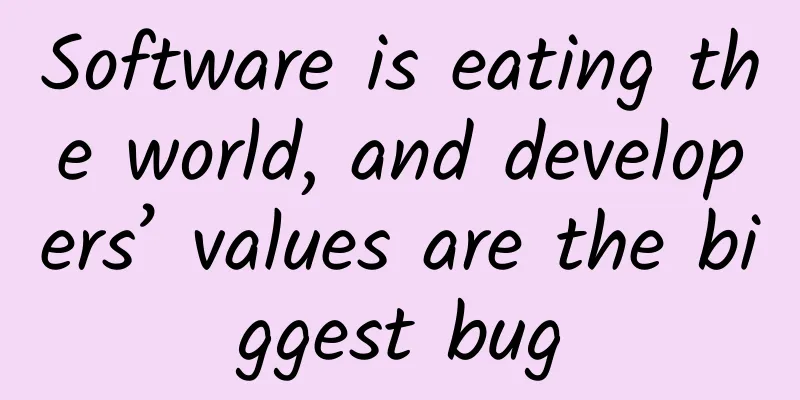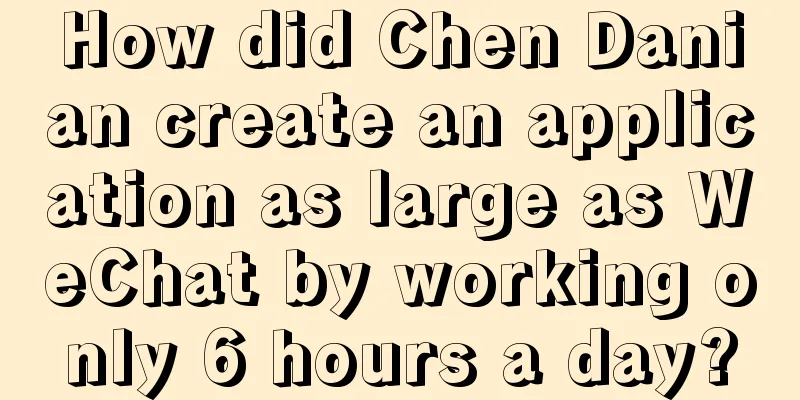Software is eating the world, and developers’ values are the biggest bug

|
Original English text: Software Matters in the World Editor's note: Software has not eaten the world, it has just made the world succumb to the values of its creators. Although most software practitioners are full of positive energy, they cannot prevent the influence of some negative values, especially when the software has billions of audiences, the impact of bad events will be very wide. Compared with those display problems or calculation errors that occur inside the software, errors that exacerbate (or cause) major social problems are major bugs. Fog Creek Software CEO Anil Dash pointed out that practitioners have always ignored this type of major bug in the past, and now it is time to work together to fix these major errors.
It’s a cliché you hear at nearly every tech conference (and many non-tech business events) that “software is eating the world.” This provocative statement (and effective marketing for his venture capital firm, Andreessen Horowitz) comes from Marc Andreessen, but it misses one of the most important parts of the story. Yes, nearly every industry is being transformed by the power of technology. But it’s not just business processes that are being transformed—it’s also the way workers are valued, the economics that shape industry, and even the foundations of how we communicate with each other and understand the world. Software didn’t eat the world: it just bent the world to the values of those who made it. And not everyone is happy with the results. In programmer terms, there's a big question to answer: When software eats the world, is it a bug or a feature? Find all positive energy The good news is that most people who make software have a lot of positive energy in common. At the risk of overgeneralizing, tech workers tend to value creative expression and personal autonomy, are often skeptical of legacy systems that have become insensitive to their own structure, and have a genuine optimism that even the biggest problems can be solved. But that’s not the whole story. In the current global rise of populist movements, we are witnessing the first backlash against technology since the advent of the internet. Some of it is economically based—people who work in technology have become wealthy while many others have not, and some of the ways in which they have become wealthy are beginning to feel like nasty accidents. There are also deep concerns about the consequences of technology for our privacy and security, as well as for our jobs and the economy. That’s not to mention the cultural shifts that have been wrought by the ubiquity of connected devices and social media. A lot of the public’s distrust can be attributed to some of the more negative tendencies in tech culture. As with everything, our best traits can sometimes become our worst flaws. Technology is no exception. A love of individual autonomy can lead to a lack of collective responsibility. A skeptical attitude toward institutions can lead to a kind of “disruption” where imperfect systems are replaced by no systems at all, or by systems that only benefit the creators of the technology. An optimistic belief that all problems can be solved sometimes leads technologists to believe that they are the only ones who can solve them. And all of these problems are exacerbated by the inherent ills of technology, meaning that they affect marginalized communities even more severely. Fixing major vulnerabilities One of the most common tasks in making software is simple: fixing bugs. Historically, we've thought of "fixing a bug" as a relatively straightforward thing to do - maybe your app looks a little weird in a user's web browser. In the worst case, maybe some of its calculations are broken, and you have to upgrade the software. When we started out as a small independent company in 2000, we thought about bugs in much the same way. We built a bug tracking app and tried to help people make sure they were fixing the bugs in their own software. At the same time, our co-founder Joel Spolsky wrote a lot about the culture of making software. At the height of the dot-com boom, it seemed a little odd that our founders would focus so much on the human element and ethical behavior. But it helped us gain fans, some of whom tried various apps we developed over the years, and we were lucky enough to thrive during this time and be one of the last independent companies still standing. But we’re also missing something important. Ideas and insights about how to treat people, how to listen to customers, and how to be thoughtful and responsible in creating technology are even more important than anything we put into software. Those are our first steps toward fixing what we now think of as “big bugs.” Small bugs are mistakes in software. Big bugs are mistakes that exacerbate (or cause) big problems in society. Big Bug's Bite What does “big bug” mean? Software that exacerbates racial bias in the criminal justice system is a big bug. Security policies that put sensitive data of hundreds of millions of people at risk are a big bug. Apps that secretly spies on users are a big bug. Undermining trust in legitimate news and fueling fake news? Yes, that’s a big bug. So in addition to the more obvious bugs, now is the time to make sure we prioritize fixing the big bugs. Yes, you need to check that your site displays properly on older smartphones, but also make sure your data policies respect your users. Sure, you need to deal with persistent memory leaks, but also make time to improve password storage practices. And to be clear, we’re not picking on anyone here — we’re responsible for as many systemic issues as anyone, and because we focus on the “typical” definition of a bug, we overlook our role in fixing the really big ones. Maybe it seems a bit presumptuous for a tiny software company to point out these flaws in a massive industry, or a bit overly optimistic about the impact our small community can have in changing the overall culture of technology. But we've seen this happen before, and not that long ago, when the first people started blogging about the online software that connects us to each other. They advanced the state of the art through thoughtful conversations about design, accessibility, web standards, performance, and many other topics that have become the main focus of what we take for granted when developing applications. We think it’s time for a new generation of coders to work on these more important questions of access, equality, fairness, and fundamental equity. The clearest statement we can make is simple: software matters. |
<<: 10 practices from over 30 years of coding experience
>>: Unconsciously, Apple has also used the strategy of flooding the market with products
Recommend
Didi Zhang Wensong: Technology changes life, using big data to "solve traffic jams"
【51CTO.com original article】 “ Zhang Wensong: Cha...
How do Tik Tok influencers promote products?
Our Douyin influencer promotion business has been...
It is easy for laymen to be confused when buying mobile phones. These parameters are not important. Don't be deceived by merchants.
1. Mobile phone macro and portrait lenses, especi...
How much does it cost to customize the Tai'an Gardening Mini Program? Taian Gardening Mini Program Customized Price Inquiry
How much does it cost to customize the Tai'an...
How to expand the volume of Baidu search oCPC delivery?
Search ocpc can be said to be the general trend o...
Engineering and cost management from the perspective of the project manager, a compulsory course for improving project manager's ability
Engineering and cost management from the perspect...
Image sliding gradient
Source code introduction: Android image sliding g...
Private domain traffic methodology!
In this article, we will share from the following...
How to promote an event well?
With the rapid development of various industries,...
7 questions and answers about keyword promotion!
Contents of this Q&A: 1. The keyword search v...
iOS Native and JavaScript Interaction
When it comes to the interaction between Native a...
9 Tips for Facebook Ads Creatives!
Have you ever experienced your Facebook ad perfor...
What are the reasons for the poor results of Baidu’s bidding promotion?
Customers often visit the official website to inq...
The latest news on Changchun’s lockdown in 2022: When will it be lifted? Attached with the latest notice
Although the number of new local cases in Shanghai...
The most amazing history of Song Dynasty
The most amazing history of Song Dynasty in histor...









